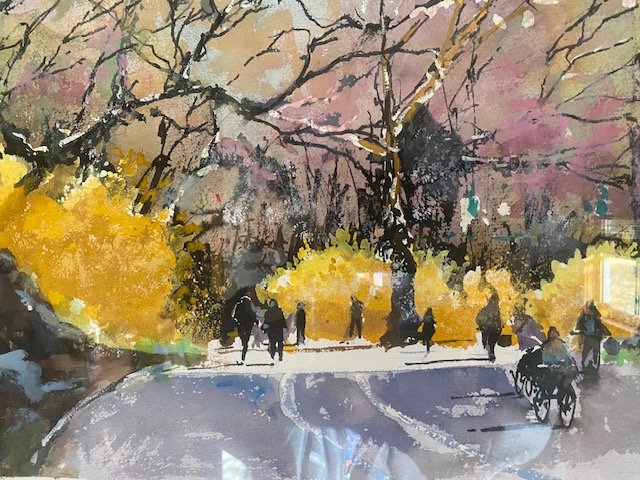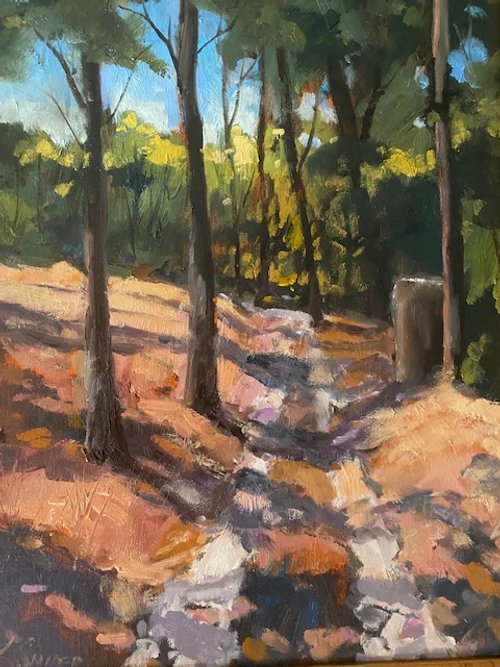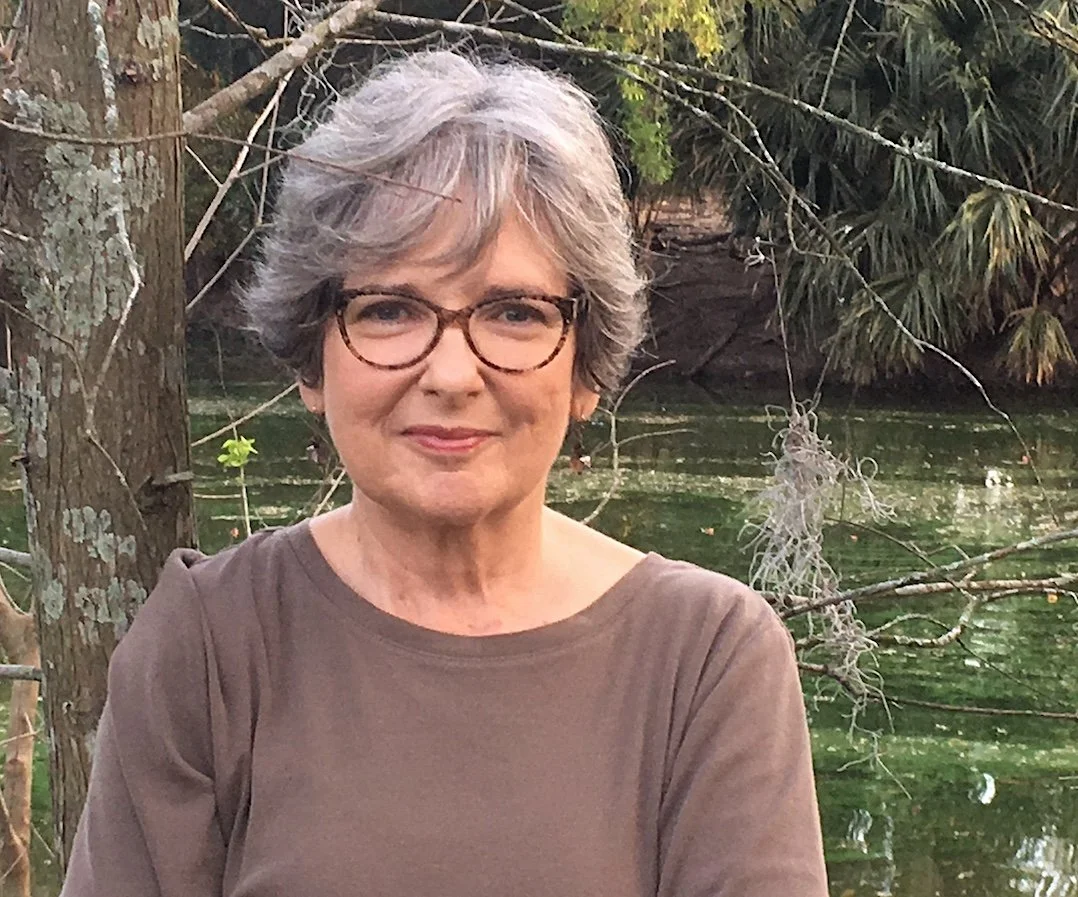Interview with artist Bob Snider
Bob Snider is an Arkansas painter known for his vibrant outdoor scenes. His paintings are in corporate and private collections throughout Arkansas and across the US. More of Bob’s work can be found at Art Group Gallery in Little Rock and at his website bobsniderfinearts.com.
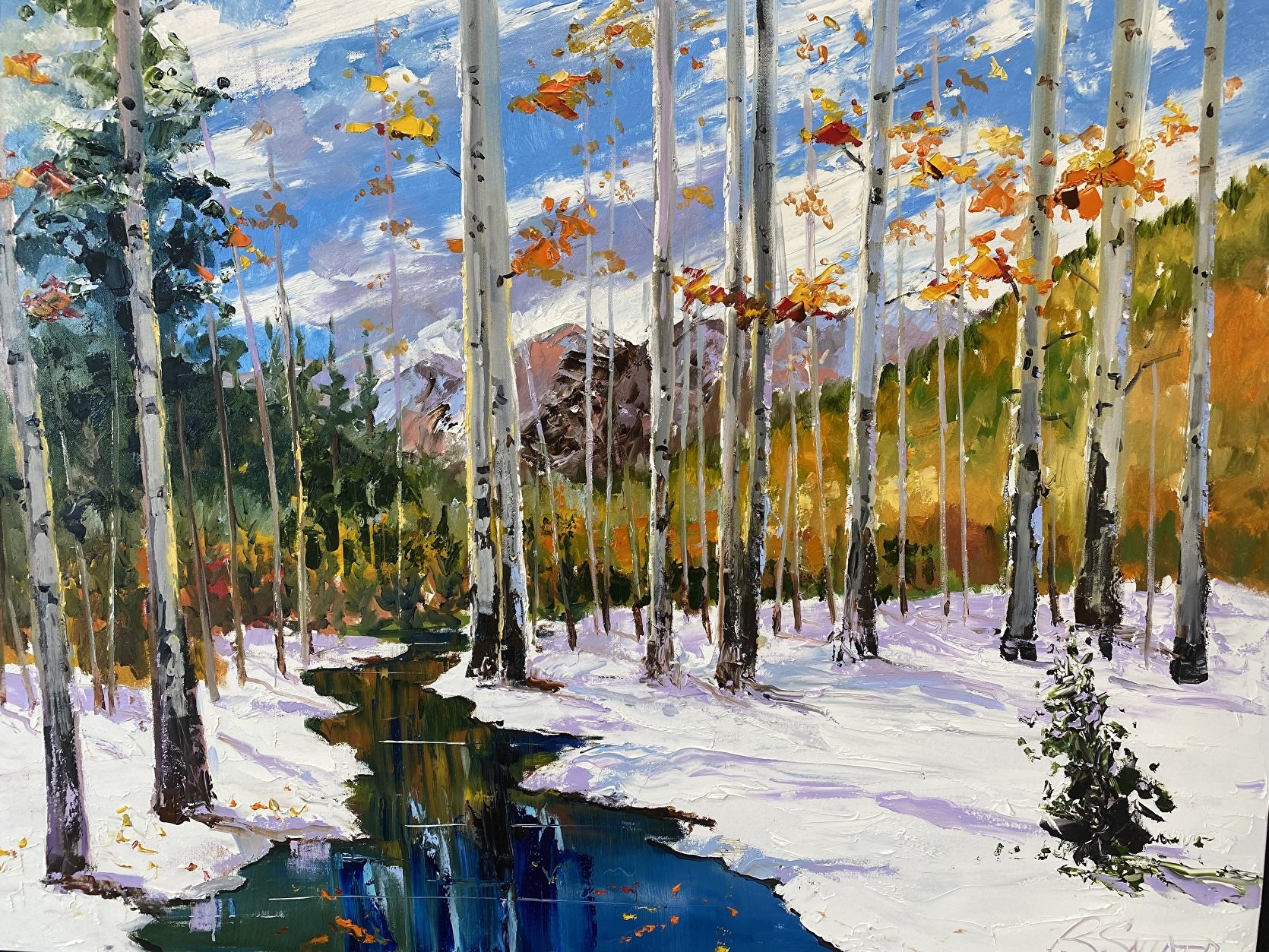
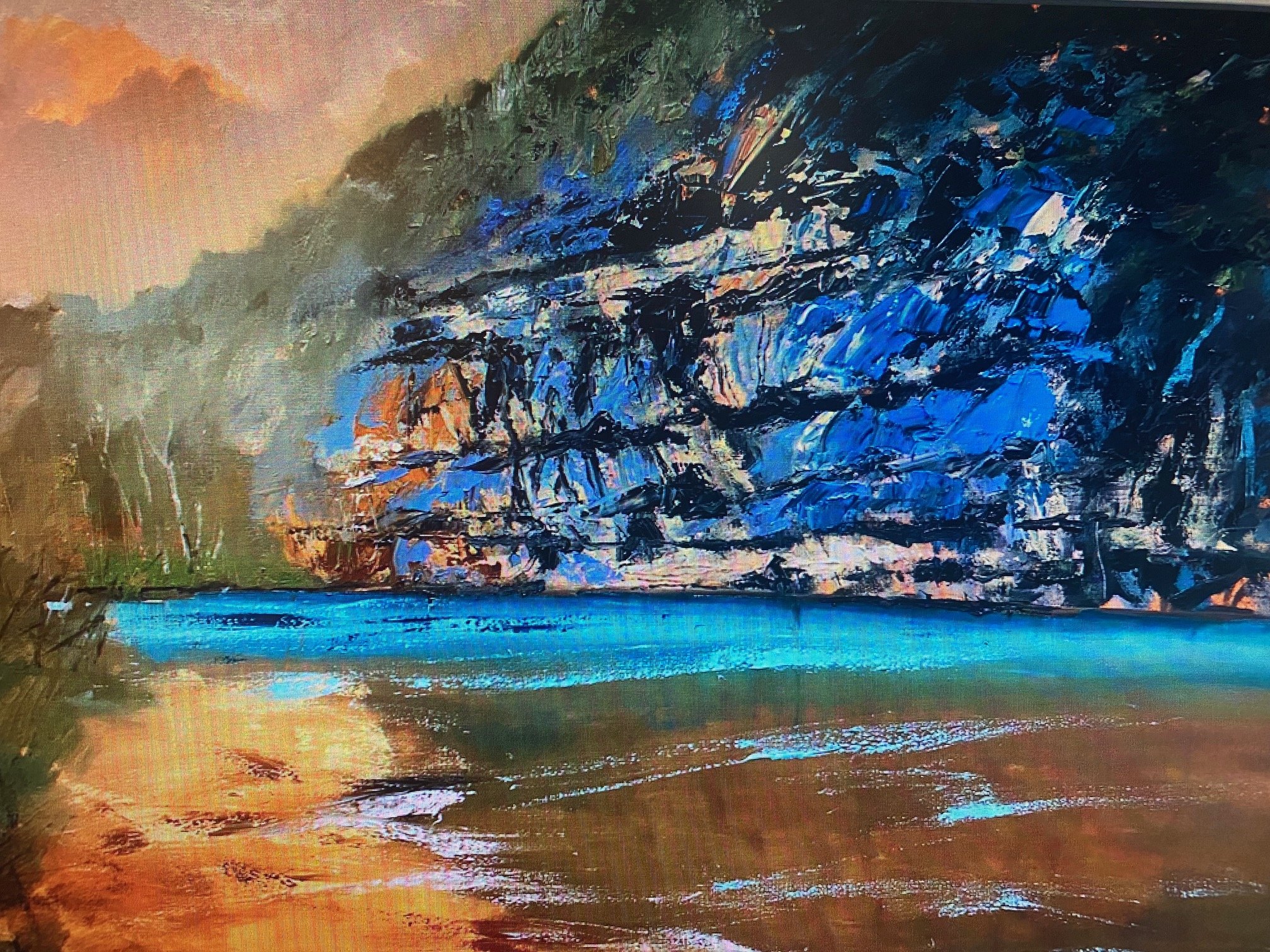
AAS: Bob, are you an Arkansas native?
BS: Yes, I am a native Arkansan. I was the kid in the back of the classroom, drawing pictures of my teachers and selling them at recess for the coins in my classmate’s penny loafers. That introduction to my art career ended when the teacher sent me to the principal’s office. I graduated from Ouachita Baptist University in 1968 with a double major in art and business. But with a war going on in Vietnam, this seemed like a good time to get an educational deferment to get my MBA at the University of Arkansas.
But I did serve and following two years as a lieutenant at Ft. Benning Ga, I got my first real job as Press Assistant to US Senator John L. McClellan in Washington, DC. I really didn’t know anything about politics but my interest in art and design led to a natural fit on the Senator’s campaign team. And the political relationships I developed helped me land a position with an Arkansas Investment firm, T.J. Raney and Sons that was subsequently purchased by a Memphis firm, Morgan Keegan. My thirty-year career as an investment banker in the area of municipal finance taught me a lot about selling and “professional persuasion” that I can trace back to peddling my first drawings in elementary school.
Life circumstances (divorce) put me in a position to pursue my love of art by signing up for a beginning water media class at the Arkansas Arts Center. With the gentle encouragement of our teacher and a class of encouraging fellow students, I was able to make a lot of progress. And I was hooked.
AAS: In a way you really started a second career as a full-time painter. What was that transition like?
BS: My second career as an artist actually started when I attended a seminar near Chicago for worship leaders. The speaker asked a simple question, “Do you consider yourself an artist?” I never really had thought about that. I just considered art as something I enjoyed doing but not as a real artist. The speaker challenged everyone in the auditorium to accept the challenge of identifying as an artist. The speaker then said, “It’s interesting that God called an artist, Bezalel to build the temple before he called preachers or soldiers”.
At that time in my life, I really didn’t know what I was going to do to make a living as a fifty-year-old divorced man in Little Rock. While in a men’s discussion group I was approached by one of the pastors with an interesting challenge, “What if we could build a bridge between our local church and the arts community in Little Rock?” I tossed and turned that night as I thought about applying the elements of our annual Mid Southern Watercolorist juried painting competitions that I had directed as President of MSW to a Biblically themed juried arts show?
So, with the help of the creative team from the church we developed a template for a church sponsored arts show that would include artists, churches, and be based on interpretations of stories from the Bible. This approach would help accomplish the mission of the church and provide an opportunity for artists.
John 22-15, 24” x 20”, oil on canvas
Over the next few years, we created annual shows on themes that included “The Creation Story”, “Jonah” which featured an original symphony by the Arkansas Symphony Orchestra; “The Prodigal Son” and the last one was “The Messiah” which included two performances at the Arkansas Governor’s Manson featuring the Ouachita Baptist University Choir.
One of our art shows was on the theme of “Saving Peter” based on the account in the 21st chapter of John. My entry was going to be a portrait of Peter and I was having difficulty finding a model. I asked my son John, who was in town visiting from Waco, to come out to my studio and pose for a few pics as Peter. John’s wife Jamie had just given birth to a baby boy who they named Simon. A few weeks after I finished the painting I realized the significance of John 21:15. “Simon, son of John do you love Me more than these?”
AAS: I want to ask you first about your horseracing scenes. The way your paintings communicate the excitement and speed is just wonderful. American Pharaoh is one of my favorites. Why did you start painting horse racing scenes?
American Pharoah, 48” x 60”, oil on canvas
BS: Being an artist gave me the freedom to invest my time and talent exploring subject matter that excited me. Although I learned a lot painting floral still life, what really interested me was applying those principles to create dramatic scenes that were a part of my life.
Being a daily reader of the sports page in the Arkansas Democrat Gazette, I saw lots of photos of outdoor scenes, to include thoroughbred races at Oaklawn in Hot Springs. So, I painted a 16x 20 watercolor of three horses racing toward the finish line, employing all the fast and loose techniques that I was developing. That little painting won best in show of the fall exhibit and set me on a track to paint the same way with oil on very large canvases. Scenes of American Pharoah and of the Arkansas Derby are among my favorites.
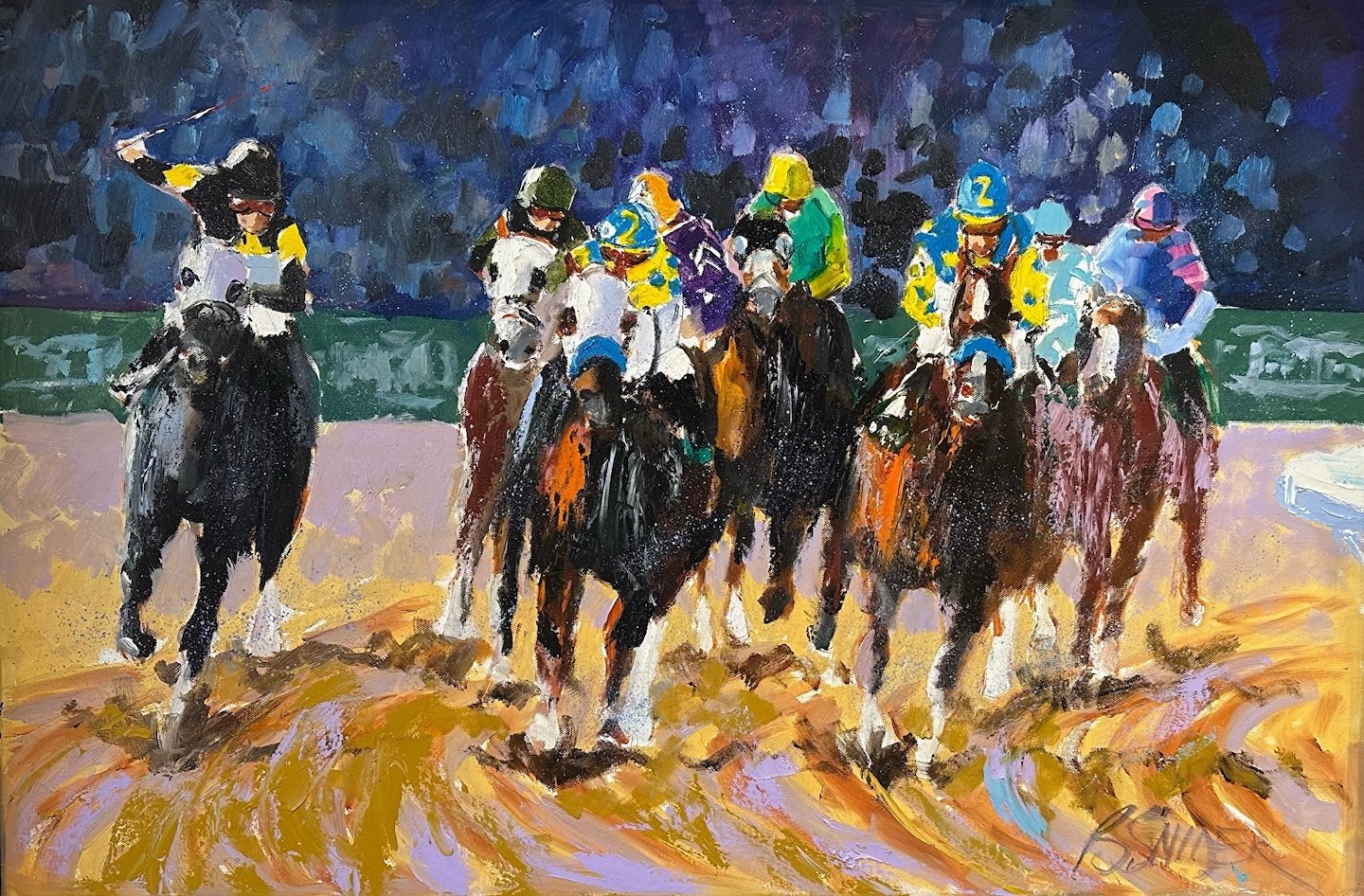
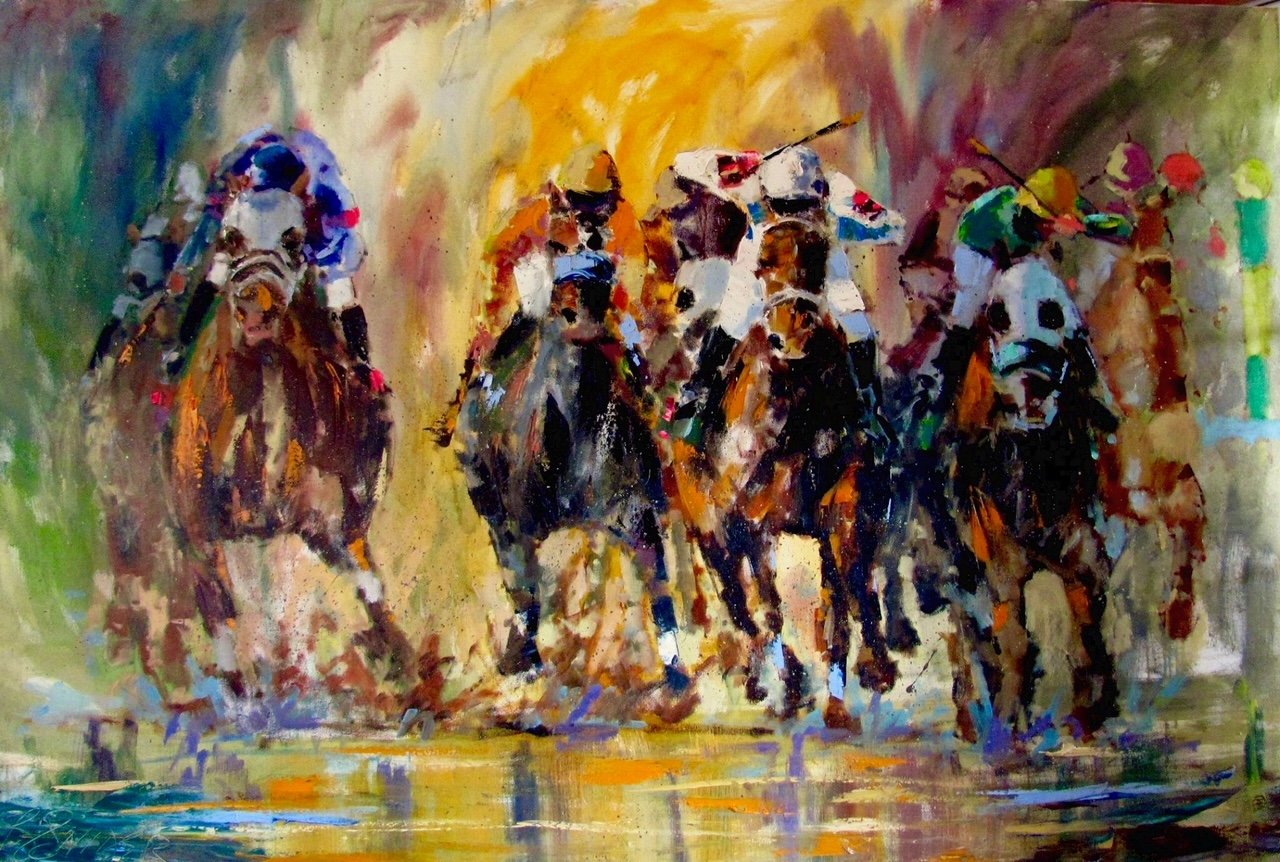
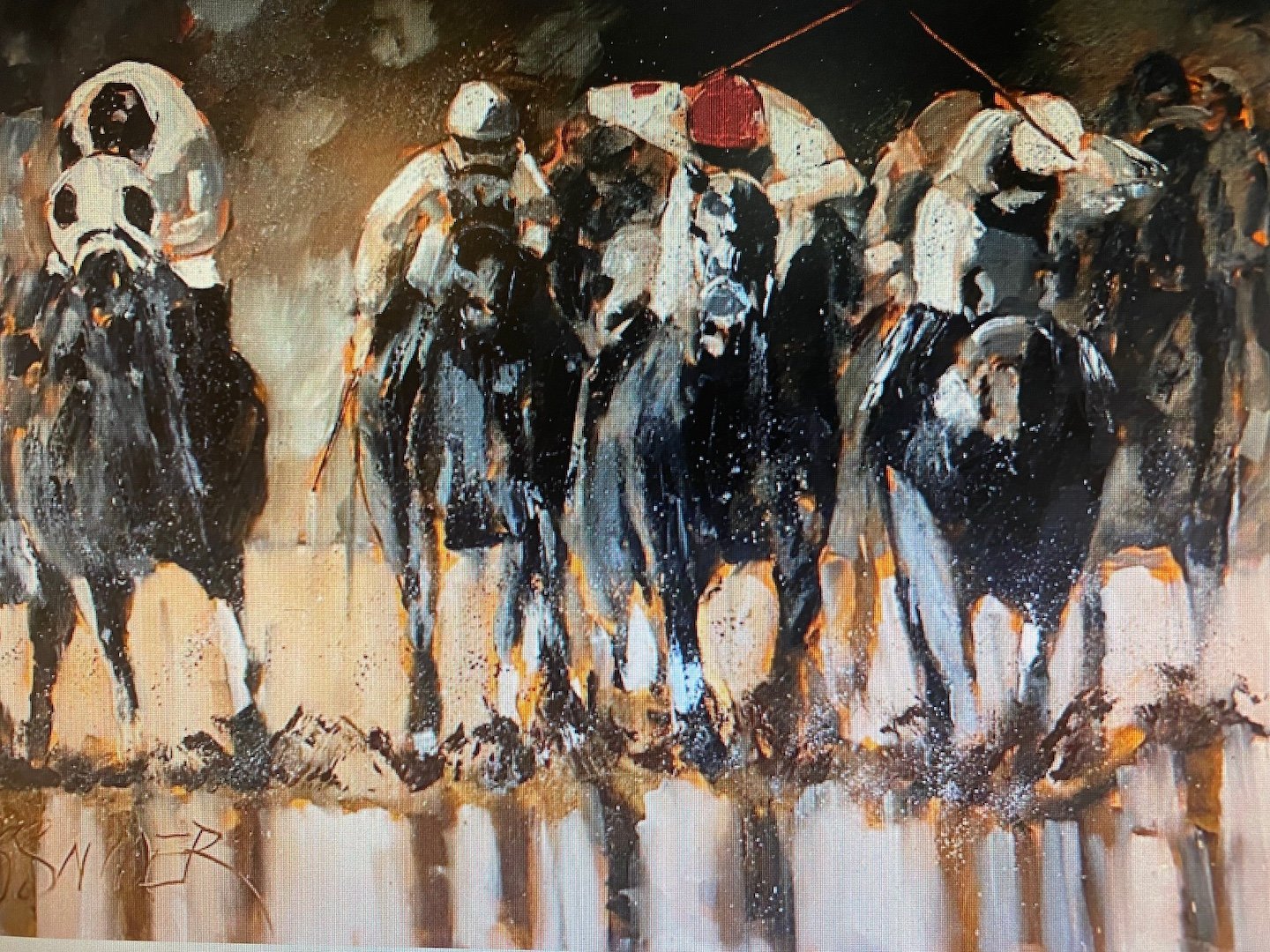
AAS: Many of your paintings celebrate the beauty of the Arkansas landscape and, frankly, the fun that can be had here. I think Fly Fisherman is a good example of that. Tell me about that painting and are you much of fisherman or hunter?
Fly Fisherman, 24” x 36”, oil on canvas
BS: It has occurred to me that women buy most of my art, but that a lot of it is purchased with a man in mind. Since I love hunting and fishing, as well as horse racing, those paintings have become favorites of collectors and on the walls of The Arkansas Game and Fish Commission and several other offices and restaurants. I find a lot of great photos on Facebook and always get permission from the photographer to use them as a reference, usually blending elements of several scenes into one painting.
AAS: And of course, there are your exciting duck paintings. My favorite is the close-up simply titled Duck.
Duck, 24” x 20”, oil on canvas
BS: When art is taken seriously it becomes an inescapable part of your life and shows up everywhere. One of those places for me is the natural world in which we live in Arkansas and the importance of recreation to include hunting and fishing. Both of these endeavors take place on the water. Duck hunting has been a big part of my life since I was little boy with cousins and uncles who grew up on Bayou Meto near Stuttgart. This painting, entitled "Duck" is pure fantasy. Mallards cupped and sailing and so close you could reach out and touch them. I only shoot them these days with my iPhone camera.
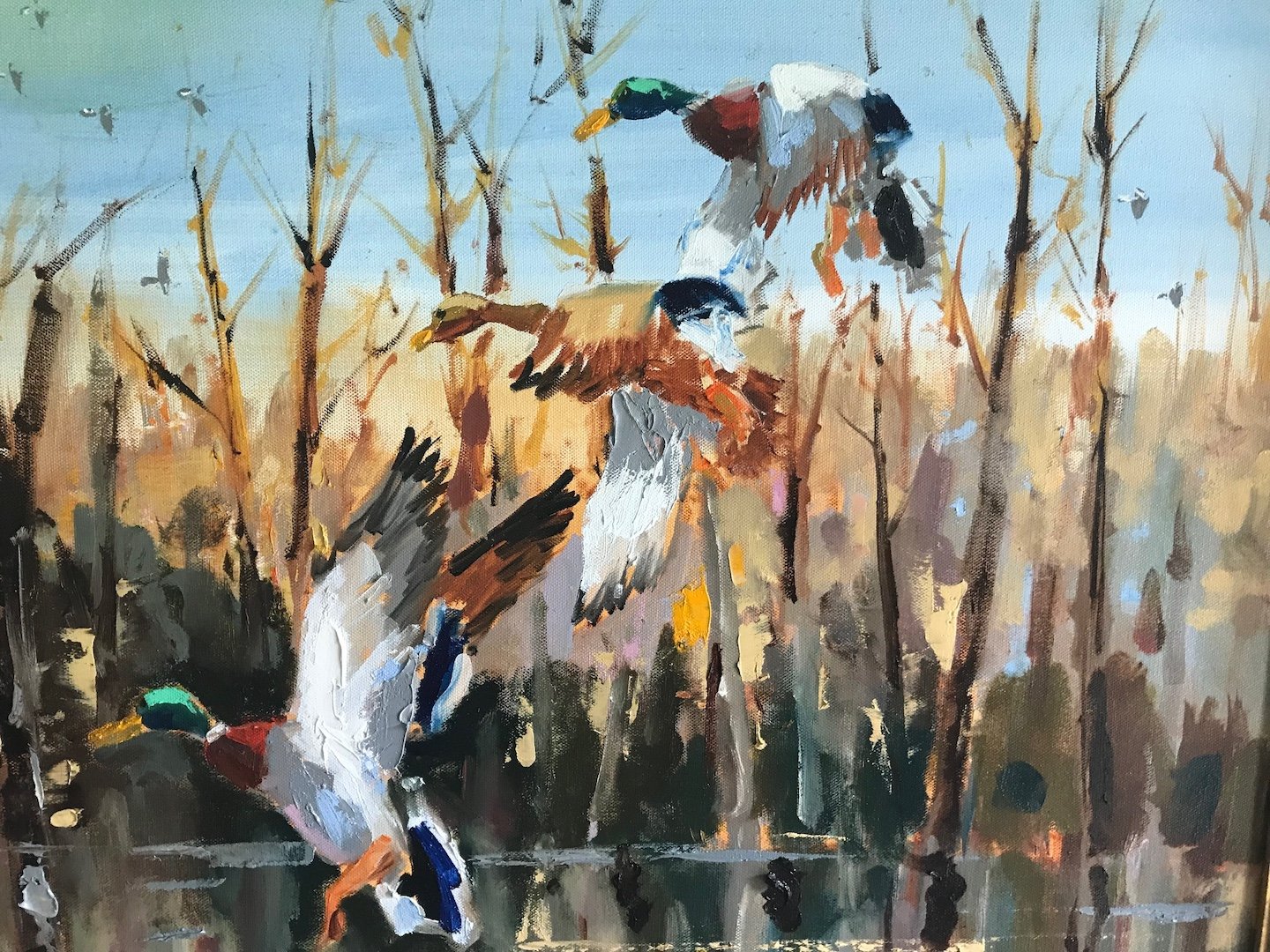
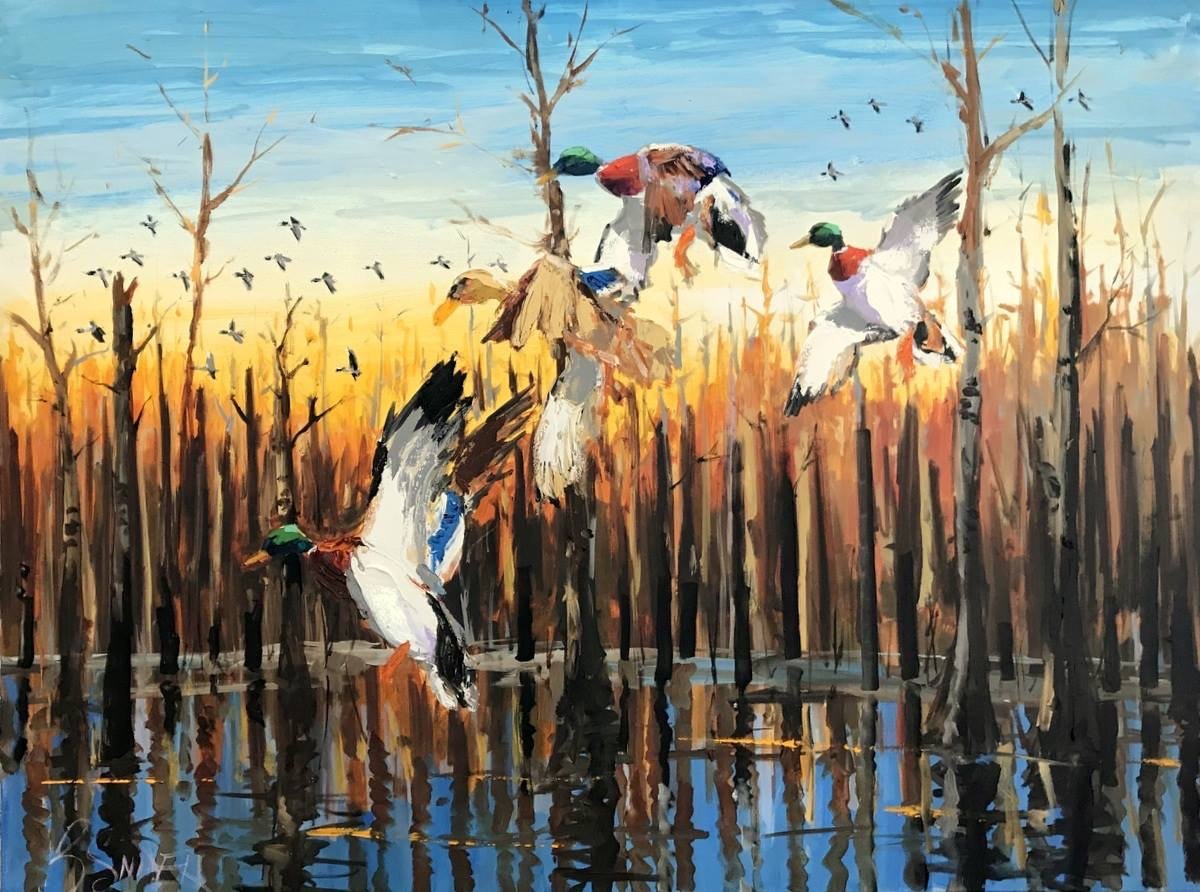
AAS: I know you have traveled in France and Italy studying and teaching and this has resulted in some lovely paintings done en plein air. I would think those trips and experiences can really rejuvenate the love of painting. What do you remember most or love most about those trips?
BS: One of the great things about being an artist is the opportunity to travel and write off the expenses against income. After I took the first trip to the Amalfi region of Southern Italy, I saw the opportunity to organize trips with my local fellow artists to Provence in Southern France. These trips introduced me to plein air painting in the ala prima style. That means painting outdoors in the open air and finishing the painting in one sitting. Since I like to paint fast and loose, this approach to painting fits my style.
I have met artists from many places who attend workshops and incorporate their love of painting with the joys of travel. Although some of them are young and may be just starting their art career, most are closer to my age and are in it for the adventure of exploring the places like Arles in Southern France where Van Gogh and Monet and other the great impressionist painters lived and worked.
AAS: I assume Lavender Fields of Provence was painted on one of those trips. It is so lovely. Tell me about it.
Lavender Fields of Provence, 30” x 40”, oil on canvas
BS: On one trip to Civita, Italy I met a renowned artist named Julian Merrow-Smith and have made three trips to the Provence region of Southern France to attend his workshops. Two of those trips were in the month of July when the Lavender was in full bloom and ready to harvest. Lavender Fields of Provence is one of my favorites that started as a plein air sketch and was finished in my studio.
AAS: In Pink Sunset, you seemed to use a somewhat different painting style, which perfectly captured the essence of that sunset. I just love it!
Pink Sunset, 36” x 24”, oil on canvas
BS: There are only three primary colors: red, blue and yellow. But artists at every level observe an endless variety and combination of these three in the natural world as they dance and blend minute by minute from light dark to light. We have the Creator to thank for the science and mystery of color and form and composition. And He does it every morning with the sunrise and evening in the sunset. When we think we've captured even an inkling of majesty of the sunrise on canvas we are totally humbled when the pinks and golds soften before our eyes.
I've painted plein air quite a bit in Florida and in France and try to take advantage of a new line of brilliant oil paints that offer more pop. And the pallet knife gives me the means for producing thicker textures to cloud formations. But when I think I've actually painted something that creates the illusion of nature, I am humbled by the "real thing".
AAS: Is oil your medium of preference?
BS: My first attempts at painting in school were in watercolors and acrylics because they were the only media available for students. The watercolor class at the Arts Center introduced me to a professional level of painting and the opportunity to take workshops and learn from some of the best painters. It was in one of these workshops with Barry Thomas that a fellow painter, Rosemary Parker, asked me why I didn't paint with oils. I told her I didn't have oils, bushes, or canvases. The next morning, Rosemary loaned me everything I needed to paint the scene at Murry Park on the Arkansas River. So, I just used all my watercolor techniques to recreate the landscape that Barry was painting. It turned out pretty good and sold the next week for more than' I'd ever gotten for a watercolor. Now I paint exclusively with oils in my studio because I can paint quicker and larger.
AAS: Bob, tell me about your studio and do you offer any painting classes?
Bob’s studio in Roland, Arkansas
BS: Every artist needs a studio that is devoted to making art. This can be an extra bedroom or a garage, but it should be some place where you can spread out your equipment and have room to make messes without spending a lot of time preparing and cleaning up.
When Martha and I married about 13 years ago we (she) wanted us to have a new home. Through a friend we found four acres in Roland, which is west of Little Rock and has a wonderful view of Rattlesnake Ridge. In planning our home, she was emphatic that she wanted my oil paints "out of the house". So, we built my studio that includes workspace, office space, gallery space and a loft for supplies. I have her to thank for my art career......and a whole lot more.
Although I do some teaching, like Life Quest next month, and demos from time to time, I prefer to spend my time painting, especially working on commissions with people who have an idea, place, or scene that they want to memorialize in a painting. I invite their input and really enjoy the challenge of working directly with them to create something that they love. Also, I am a member of Art Group Gallery in Pleasant Ridge Center in West Little Rock, started by Holly Tilley ten years ago. We are a community of some 20 artists who are encouraging, inspiring and wonderful friends. Art Group Gallery does offer classes, so readers interested in classes can find more information at its website.
